BLOG ARTICLE
Best Podcast Hosting Platforms For Beginners and Pro (2025)
Last updated: 2/20/2026
Last updated: 2/20/2026
Embarking on your podcasting journey may seem overwhelming, especially when it comes to choosing the right hosting platform. Don't fret; we've got you covered! In this guide, we'll walk you through the four best podcast hosting platforms in 2025, making your entry into the world of podcasting a breeze.
But before we begin, what exactly is a podcast hosting site?
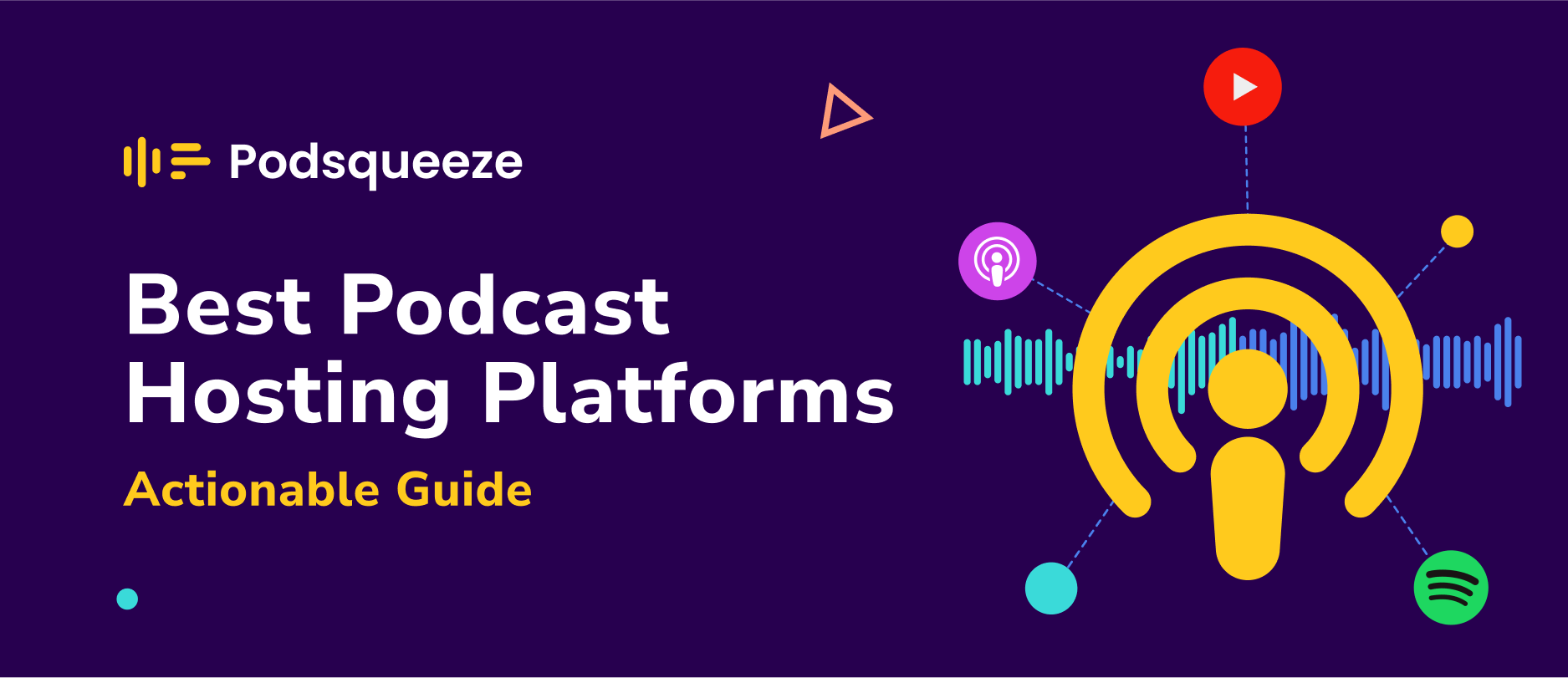
What is podcast hosting?
A podcast hosting platform is like a home base for everything related to your podcast. It includes the files and data of your show, and everything that makes your show accessible and evenly distributed to relevant podcasting platforms like Spotify, Apple, and Google Podcasts.
It is like the backend of your entire show, just that some people already prepared it for you. You only need to pay (if not free) and get your podcast up and running.
With that caveat out of the way, what are the features you should look out for when choosing a host for your podcast?
How To Choose the Best Podcast Hosting Platform
Choosing a podcast hosting platform that fits your needs is tricky, and migrating from one platform to another is time-consuming. So, it makes the most sense to make an informed decision and choose a host carefully. Here are some tips you can use to find the perfect fit for your podcast:
1. Long-Term Storage
Podcast hosting platforms differ in their offerings. Some platforms have a limit on the number of episodes they let you upload in a month, the hours of audio you can upload, and the storage capacity.
If you’re uncertain about the hours of content you’ll produce (in the case of interview podcasts) or produce many hours of content in a month, the natural choice is to pick a host that offers episode limits instead of duration limits. But, if you’re certain about the hours of content you’ll produce in a month, you can easily ascertain better which host to choose.
2. Downloads Limit
Another way podcast hosts differ is the download limit. If you cross a certain number of downloads on your podcast, you need to move to the next tier. If you have a high number of downloads that are rapidly increasing, this might be a concern since the cost can add up. This is especially true when you have multiple podcasts. Some hosts offer unlimited downloads, you can choose those if this is a problem you seem to face.
3. Multiple Podcasts
If you have multiple podcasts, managing them all with one account becomes necessary to avoid chaos. Some podcast hosting platforms charge for extra podcasts, while some let you host as many podcasts as possible. The podcast hosts that offer you the latter would suit your needs better, so keep that in mind as well.
4. Teams Feature
In case you don't have a solo podcast but have a team that manages your podcast(s), the Team feature becomes a crucial feature to look out for. Before choosing a host and plan, check how many team members you can add, how many teams you can make, whether your team members would require a paid plan of their own, and if you can control the access each team member gets.
5. Cost-effectiveness
In an ideal world, we’d love to not have any budget constraints in our podcasting journey but sadly, that’s not the case for a lot of podcasters out there. Thus, choosing a podcast host based on your budget also becomes a priority. Based on the above factors, you can see which podcast host is cost-effective and fulfills your needs.
Considering these tips, which podcast platforms check all the boxes mentioned above?
1. Hubhopper: Asia’s Pioneer in Podcast Hosting
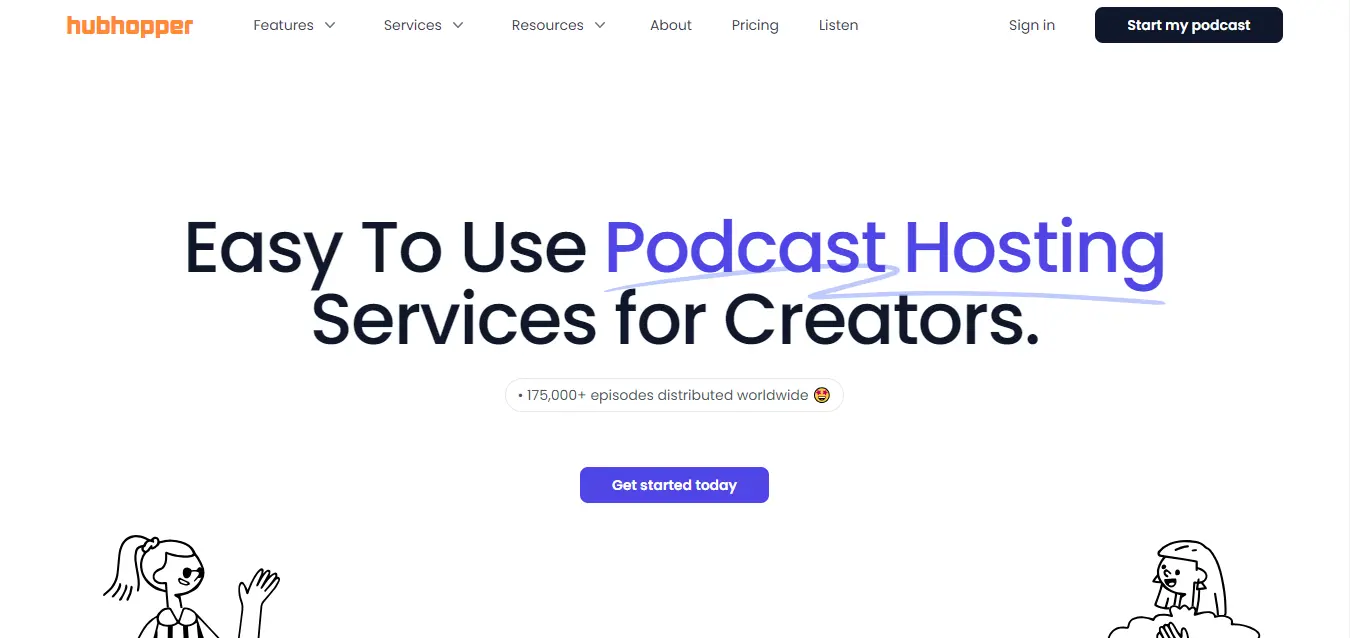
Founded by India's Podfather, Gautam Raj Anand, Hubhopper is a popular choice for podcast hosting.
Their user-friendly interface, distribution to global platforms as well as exclusive platforms in the emerging markets (increase your reach and listens), accompanied by helpful prompts and pro-tips, makes Hubhopper an excellent choice for podcasters looking to start their journey with confidence. The best part is the ease of choosing a plan - based on your monthly upload frequency.
Best Features:
- Unlimited podcasts, downloads, storage, episode duration, bandwidth
- Has a free plan
- Easy to use
- In-built audio recorder and editor
- Publish podcasts to global as well as exclusive platforms
- AI features
- Teams feature (role-based and multiple team)
- Private Podcasting
- Unlimited Scheduling
Pros:
- User-friendly interface
- Monetization opportunities with a custom podcast website
- Unlimited podcast hosting without download or upload caps
Cons:
- Analytics limitationLimited tool suite compared to top competitors
Pricing:
Hubhopper caters to both free and paid plans (starting at $12/month). Premium features, such as AI integration, private podcasting, and team collaboration, differentiate the plans.
2. RSS.com: Easy Podcast Hosting with Advanced Features
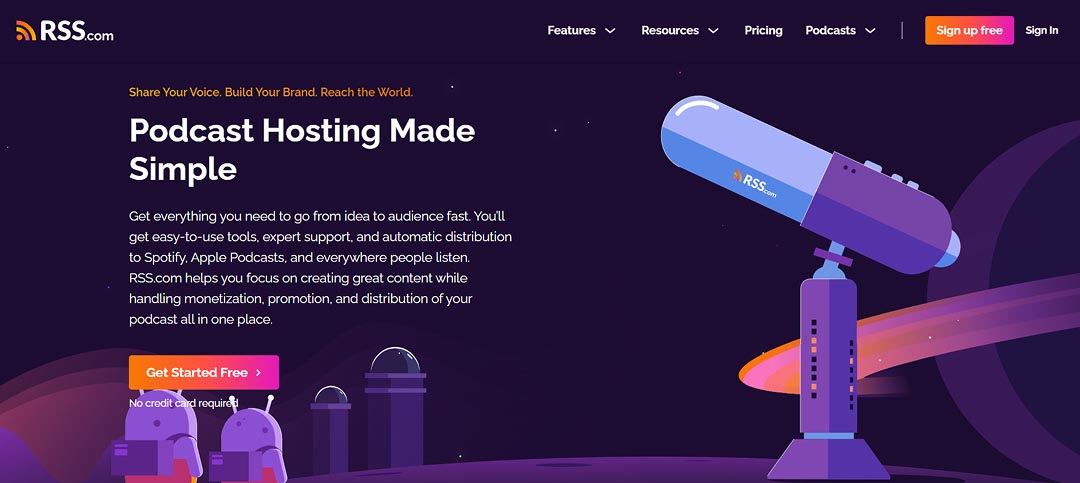
RSS.com podcast hosting combines user-friendly design with powerful features. With a simple platform that includes everything podcasters need to launch, grow, and monetize at one low price, RSS.com makes podcasting accessible to creators at every level.
Best Features:
- Unlimited podcasts, downloads, storage, and episodes
- Multiple monetization options
- IAB-certified analytics
- Automatic distribution to major platforms like Spotify, Apple Podcasts, etc.
- Free AI-powered transcripts in 14 languages
- Audio-to-video conversion for YouTube podcasts
- Podcasting 2.0 tags
- Teams feature and social media sharing
Pros:
- Comprehensive all-in-one platform with advanced features at a low price
- Strong monetization opportunities for podcasts of all sizes through dynamic ad insertion
- Excellent customer support with 4.95-star rating across review platforms
Cons:
- Relatively newer platform compared to some established competitors
- Advanced features may require a slight learning curve for beginners
Pricing:
Start podcasting free for 30 days, then unlock unlimited episodes and pro features starting at just $11.99/month.
New podcasters can get a full three months free using coupon code FRIENDS
3. Buzzsprout
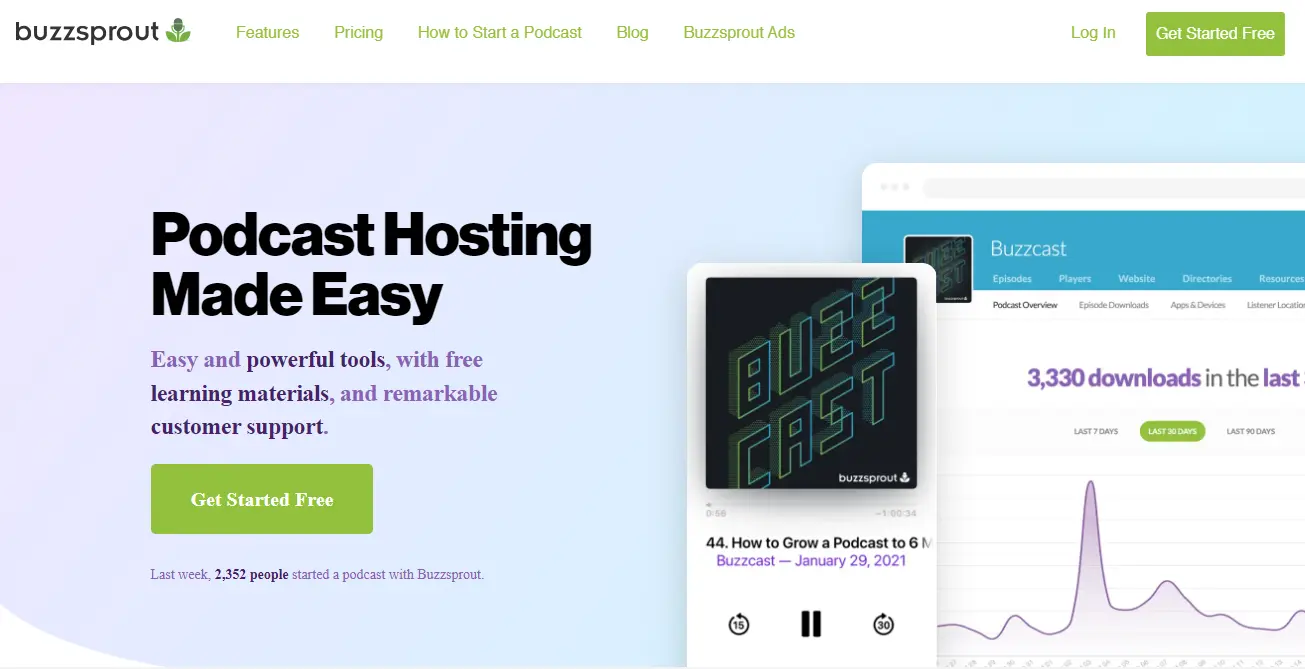
Buzzsprout has a unique approach and they focus on monthly upload hours rather than episodes. The platform also provides a wealth of educational content, making it an excellent resource for podcasters seeking guidance and support.
Best Features:
- Unlimited podcasts
- Has a free plan (with restrictions)
- Audio mastering add-on
- Publish podcasts to global platforms
- AI features (add-on feature)
- Teams feature (role-based)
- Unlimited Scheduling
Pros:
- You can comprehensively distribute your podcast across all platforms
- Buzzsprout also provides unlimited storage
Cons:
- Limited free plan
- Basic analytic dashboard lacking in-depth insight that podcasters might require
Pricing:
Buzzsprout, with its free and paid versions (starting at $12/month), offers flexibility for podcasters at different stages. The free plan is a great way to begin, but be mindful that episodes are hosted for only 90 days.
4. Captivate
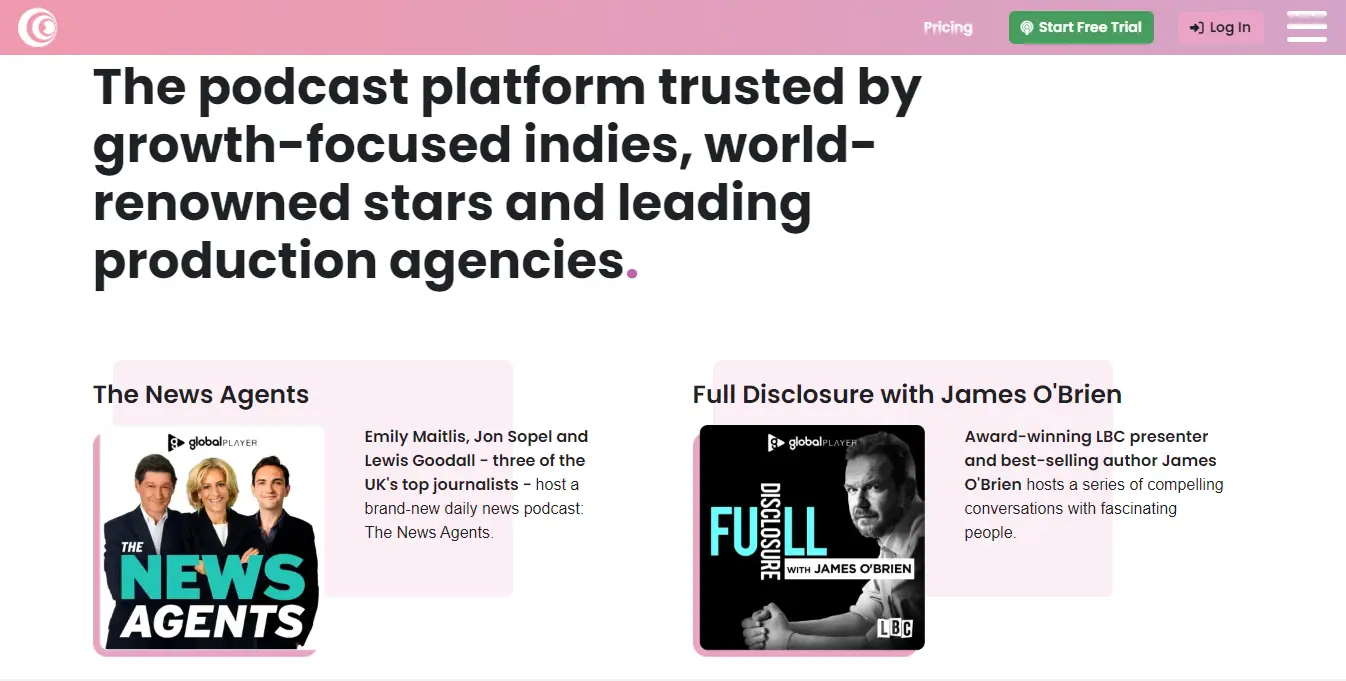
Founded by the British Podcast Guy, Captivate boasts an array of features designed to help grow your podcast. While it may have a steeper learning curve, the investment in time is well worth it. They don’t have a free plan but offer a 7-day trial. With Captivate, you have the tools to take your podcasting journey to the next level.
Best Features:
- Unlimited podcasts, storage, and episodes
- Publish podcasts to global platforms
- Podcast production tools
- Teams feature (role-based)
- Private Podcasting
- Unlimited Scheduling
Pros:
- Comprehensive podcast analytic dashboard
- Marketing and growth tools for increased podcast visibility
- It also supports monetization features
Cons:
- Fairly expensive than competitors
- Its website builder might have some customization limitations
Pricing:
For serious podcasters ready to invest upfront, Captivate is the go-to platform (starts at $17/month).
5. Transistor: Streamlined Excellence in Podcast Hosting
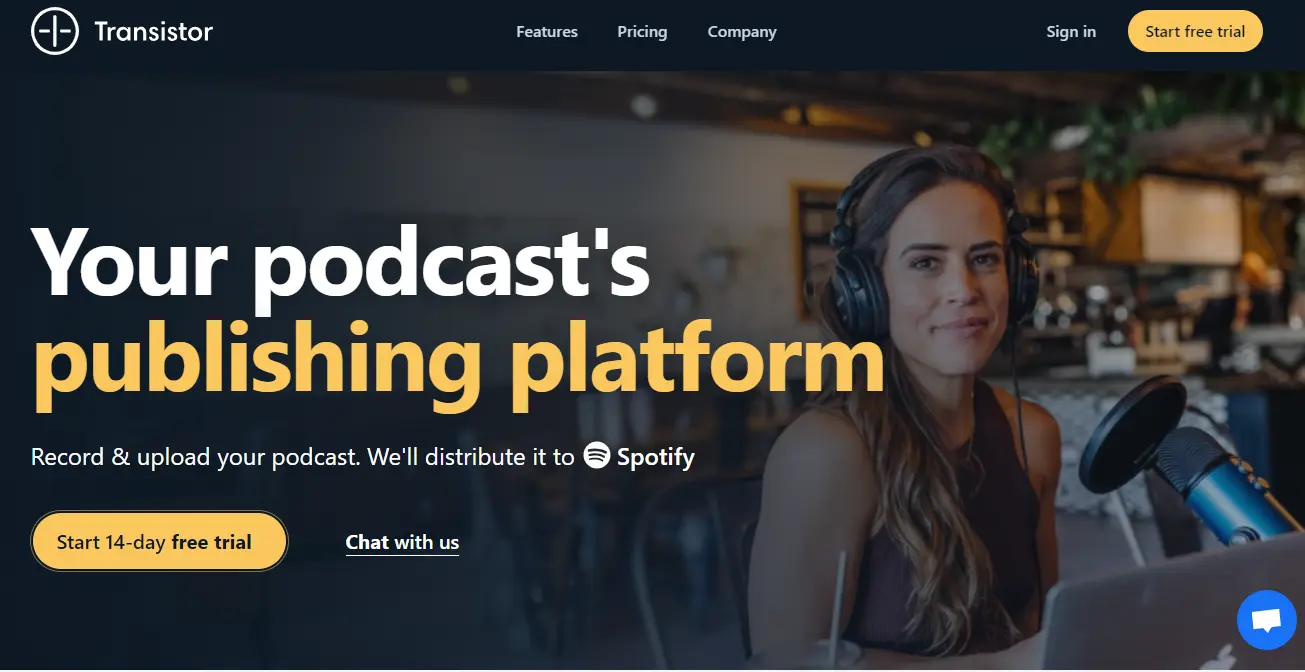
With a straightforward user interface, Transistor simplifies the podcast hosting and setup process, even for an absolute beginner who has never recorded clear podcast audio before. The various plans come with different download limits per month, providing flexibility to choose a plan that aligns with your podcasting goals.
Best Features:
- Unlimited podcasts, storage, and episode duration
- Easy to use
- Publish podcasts to global platforms
- AI feature
- Dynamic ad feature
- Teams feature (role-based)
- Private Podcasting
- Unlimited Scheduling
Pros:
- Intuitive and easy-to-navigate dashboard
- Fairly customizable podcast website
- Comes with dynamic ad insertion
Cons:
- Complex pricing structure
- May require some learning curve for advanced features
Pricing:
Transistor (starts at $19/month), a leading platform in the podcast hosting market, offers a 14-day free trial but lacks a free tier.
Streamline Any Part of Your Podcast Workflow With One-Click
Finding the right podcast host is important but not enough to grow and promote your podcast to what it can potentially become. That is why we've developed Podsqueeze to solve this problem for you, all with a single click.
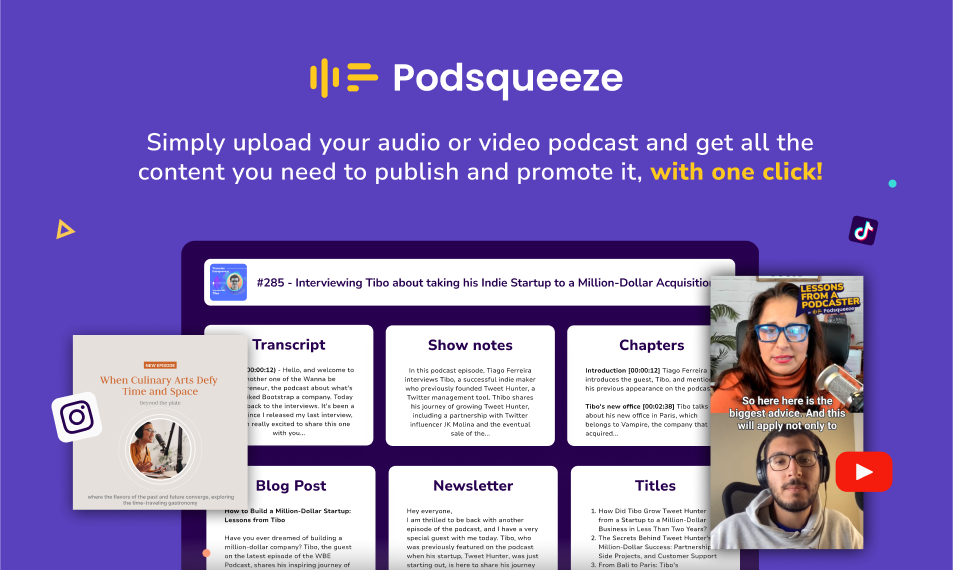
With Podsqueeze, you can create all podcast-related assets like;
- Show notes
- Transcript
- Blog posts
- Newsletters
- Podcast titles
- Podcast clips
- Audiograms
- Social media posts
- Podcast landing page
- And so much more with just a single click.
With the right podcast host and tools behind your podcast workflow, you have a proven approach to move the needle of your podcast ahead.
FAQs On The Best Podcast Hosting Platforms In 2024
Here are answers to some of the most pressing and frequently asked questions on the web about podcast hosting platforms.
1. What is the best podcast hosting platform?
This is largely dependent on what your needs are for a podcast hosting platform. However, a few popular choices for the best podcast hosting platforms are Hubhopper, Transistor, Captivate FM, Buzzsprout, and more.
2. Can I host a podcast for free?
Yes. Some popular free podcast hosting services are Spotify for Creators (offering unlimited uploads and advanced tools), Buzzsprout (providing detailed analytics with limited storage), and RedCircle (featuring unlimited hosting and monetization options).
3. Can I monetize my podcast with a podcast host?
Yes. A lot of podcast hosting platform pays. What you want is a podcast platform that opens you up to monetizing opportunities and increases your earning potential. When selecting a podcast hosting platform with monetization in mind, platforms like Acast, Spotify, and Buzzsprout can help but to maximize your earnings, here are some things you can do:
- Find sponsors yourself
- Negotiate deal directly
Repurpose your podcast content with AI